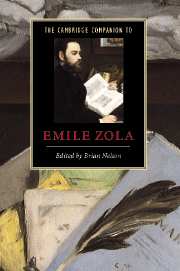Book contents
- Frontmatter
- 1 Zola and the nineteenth century
- 2 Family histories and family plots
- 3 Zola and the representation of society
- 4 Questions of sexuality and gender
- 5 Zola and contemporary painting
- 6 Zola and the art of fiction
- 7 Thérèse Raquin: animal passion and the brutality of reading
- 8 Nana: the world, the flesh and the devil
- 9 Germinal: the gathering storm
- 10 La Bête humaine: Zola and the poetics of the unconscious
- 11 Zola’s utopias
- 12 ‘J’accuse...!’: Zola and the Dreyfus Affair
- Further reading
- Index
12 - ‘J’accuse...!’: Zola and the Dreyfus Affair
Published online by Cambridge University Press: 28 May 2007
- Frontmatter
- 1 Zola and the nineteenth century
- 2 Family histories and family plots
- 3 Zola and the representation of society
- 4 Questions of sexuality and gender
- 5 Zola and contemporary painting
- 6 Zola and the art of fiction
- 7 Thérèse Raquin: animal passion and the brutality of reading
- 8 Nana: the world, the flesh and the devil
- 9 Germinal: the gathering storm
- 10 La Bête humaine: Zola and the poetics of the unconscious
- 11 Zola’s utopias
- 12 ‘J’accuse...!’: Zola and the Dreyfus Affair
- Further reading
- Index
Summary
When the Chamber of Deputies approved, in July 1906, the transfer of Zola's ashes to the Panthéon, it sought to honour, first and foremost, not the creator of the fictional Rougon-Macquart and Froment families but the author of 'J'accuse . . .!', the incendiary open letter to the President of the Republic that was the climax of his campaign on behalf of Captain Alfred Dreyfus. For the article published in the newspaper L'Aurore, on 13 January 1898, in defence of the Jewish officer who had been wrongly convicted, in December 1894, of betraying military secrets to Germany, the virtual enemy, could be seen in retrospect to have transformed what began as a legal battle over the verdict of a court martial into a much wider conflict opposing, on one side, the advocates of truth, justice and human rights, and on the other the standard-bearers of nationalism, militarism and reasons of State. In the winter of 1898-9, the very survival of the Third Republic seemed threatened, as the extremist anti-Dreyfusards, most of whom were unreconciled to the republican regime and fundamentally opposed to its ideology, fought to gain the upper hand. But in the end, when their opponents emerged victorious, the parliamentary balance shifted from the centre to the left, and a coalition of Radicals and Socialists, augmented by the left wing of the Progressists, as the socially conservative Opportunists were now calling themselves, consolidated the Republic and became the solid foundation for successive governments until the First World War.
- Type
- Chapter
- Information
- The Cambridge Companion to Zola , pp. 188 - 205Publisher: Cambridge University PressPrint publication year: 2007
- 1
- Cited by

